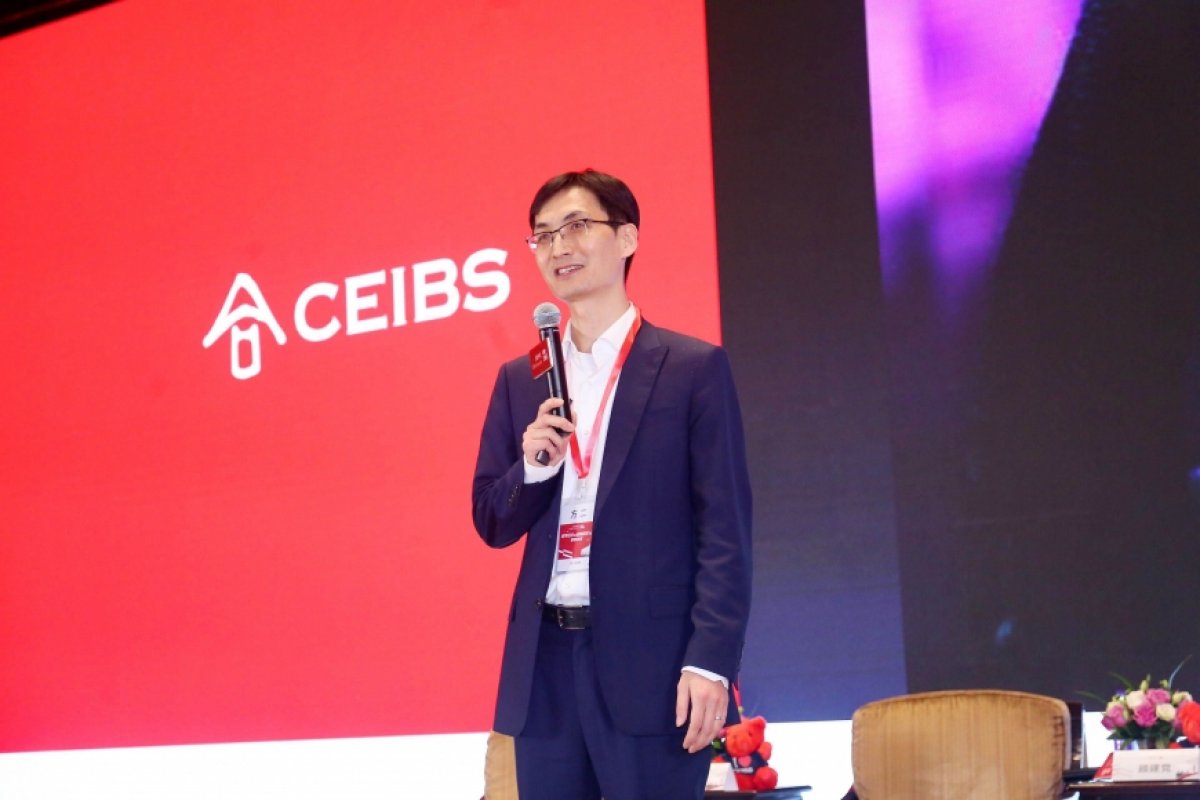Nanjing Innovation Forum Seeks Ways to Create Growth
April 25, 2019. Nanjing – Amidst a changing landscape of global trade, China’s economy has come under mounting downward pressure and is in urgent need of transforming its extensive growth model. Standing at such a critical juncture, how can domestic companies successfully transition their businesses by leveraging digital technologies such as big data and cloud computing? How can they scale new heights in the digital economy by seizing the golden opportunities arising from the development of sectors such as AI and IoT? The CEIBS Innovation Forum 2019 was held in Nanjing today, bringing together over 400 local entrepreneurs and executives. At the forum, Dr. Fang Er, CEIBS Professor of Marketing and Co-Director of CEIBS Center on Digital Economy and Smart Enterprises, exchanged ideas with local guests on how to break growth bottlenecks facing enterprises in the backdrop of business intelligence.
Dr. Snow Zhou, CEIBS Assistant President, and Mr. Wang Zhengrong, Executive Vice President of CEIBS Alumni Association Nanjing Chapter (CEIBS EMBA 2003), delivered welcome speeches. Dr. Zhou noted in his speech that China has now entered a crucial period of economic restructuring and upgrade as the country gears up for high-quality growth. This, he added, has coincided with the rise of emerging technologies – such as AI and blockchain – which are reshaping the global economic landscape and providing companies with new impetus for innovation and development. He also encouraged participants to seek ways to work together to facilitate technological innovation among companies and further the development of the digital economy. Mr. Wang further lauded the CEIBS Innovation Forum in Nanjing as a valuable opportunity for exchange and mutual learning for local entrepreneurs and a source of intellectual support for the growth of local businesses.
What has (and hasn’t) changed in the context of the digital economy and business intelligence
CEIBS Professor of Marketing Fang Er reviewed what had changed and remained unchanged in the market over the past decade and looked ahead to business development in the next five years in his keynote speech entitled, What Has (and Hasn’t) Changed in the Context of the Digital Economy and Business Intelligence.
Prof. Fang said he believes what has stayed unchanged is the prevailing business philosophy of “striving for mutual benefit and a win-win outcome” and the principle of “customer first.” Customers, however, have changed in two major ways – specifically, they are now increasingly influenced by peer circles and are faster at decision-making. These changes have necessitated a change in corporate management logic. Companies must now reshape their management systems based on customer values and restructure their brands, products, channels, and advertising by going digital. In view of the status quo, Prof. Fang offered two suggestions to help companies with their business planning in the next five years. First, he suggested a data-driven transition in terms of service and customisation. He further reassured entrepreneurs that companies would eventually benefit from a service-oriented transition despite declining profits in the short run. Nevertheless, he said companies also need to figure out how to properly identify market demands, apply data-driven approaches to planning and carry out strategic collaboration in the process of building a customisation-oriented business. Second, he recommended building an agile organisation – something he said is necessary to building efficient task forces to serve different groups of customers as the market becomes increasingly segmented and companies expand into more diversified fields.
Making breakthroughs and shaping new business thinking against the backdrop of business intelligence
Dr. Jing Wei, Executive Vice President of Suning Technology Group, shared his insights during the Forum on the retail industry and offered suggestions about digital transformation by drawing on business practices. He illustrated that the retail trade has generated nearly 500 new concepts in the past two decades, each of which has brought about a new set of operational models, management approaches, and technological platforms. However, he said that the ultimate goal remains to provide the most suitable products, best services, and best content for different customers in different scenarios no matter how the industry changes.
During a roundtable discussion moderated by Prof. Fang, CEO of Phoenix Contact (China) Holding Co., Ltd. Gu Jiandang (CEIBS EMBA 2006), CEO and Executive Director of Nanjing Xinli Culture Communication Co., Ltd. Liang Chao (CEIBS EMBA 2012); CEO of Shenzhen Sinovatio Technology Co., Ltd. Lin Dongsheng (CEIBS EMBA 2012); and Senior VP of Chervon Holdings Limited Zhang Tong (CEIBS EMBA 2010), exchanged ideas on the topic of Making Breakthroughs and Shaping New Business Thinking Against the Backdrop of Business Intelligence.
This event was organised by CEIBS and sponsored by the CEIBS Alumni Association Nanjing Chapter, the Nanjing Chamber for Import and Export Companies, and the Nanjing Branch of International Association of Business Excellence, with intellectual support from the CEIBS Center on Digital Economy and Smart Enterprises. Following the Nanjing Forum, CEIBS Innovation Forums will be held in Zhengzhou, Kunming, Qingdao, and Guangzhou. CEIBS professors and renowned local entrepreneurs will be invited to each event to discuss new business thinking in the internet era.
















